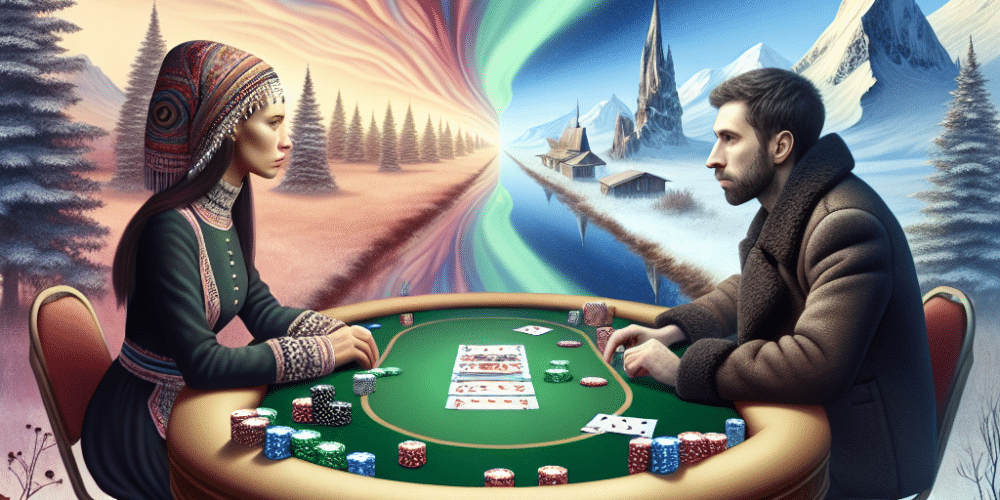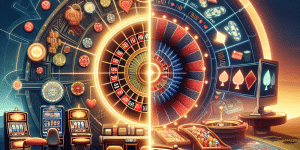In 2025, I embarked on my first trip to Asia, which led me to an unforgettable poker game at the North Korea border. This experience was not only unique due to its geographical location but also because of the tense and intriguing atmosphere surrounding the game. The Demilitarized Zone (DMZ) between North and South Korea is a place often associated with political tension and historical significance, yet here I found myself engaging in a game that is usually reserved for more conventional settings.
The poker table was set in a small room within a facility that seemed out of place amidst the heavy military presence. The idea of playing poker here initially felt surreal, as if stepping into an alternate reality where geopolitical concerns took a backseat to the thrill of the game. As I sat down, the other players, a mix of locals and adventurous tourists, shared a similar expression of disbelief and excitement.
“Poker is a game that transcends boundaries,” one of them remarked, capturing the essence of why we were all there. The shared language of the game allowed us to connect despite our diverse backgrounds, and for a few hours, the weight of the world outside seemed to dissolve. Indeed, poker has a universal appeal; it is both a test of skill and a gamble, reflecting the same unpredictability found in life itself.
From a market perspective, poker’s popularity has been on the rise globally, driven by online platforms and international tournaments that attract millions of spectators and participants. In places like Macau and Las Vegas, poker is not just a game but a significant economic driver, with casinos and related industries generating substantial revenue. This global trend of growing interest in poker has somehow reached even the most unexpected corners of the world, including the heavily fortified border of North Korea.
However, playing poker in such a setting also brings to light the stark contrast between the leisure of a game and the intense reality of the location. The DMZ is a reminder of the ongoing conflict and division between the North and the South, a place where peace is fragile and hope for reunification is ever-present, yet precarious. This setting added a layer of tension to each hand dealt, as if the stakes were somehow higher, not just in monetary terms but in existential ones as well.
Yet, not everyone shares the same enthusiasm for poker’s encroachment into unconventional spaces. Critics argue that introducing leisure activities like poker to politically sensitive areas can trivialize the serious nature of the issues at hand. They caution against the potential for such activities to distract from the greater need for dialogue and resolution. This perspective highlights an important counterpoint, reminding us that while games can bridge gaps, they should not overshadow the need for meaningful engagement with the underlying challenges.
The game itself played out with the usual ebbs and flows, moments of triumph and disappointment. I found myself reflecting on the parallels between poker and diplomacy—both require a strategic approach, the ability to read others, and the willingness to take calculated risks. As I made my plays, I felt a connection to the broader narrative of reconciliation, imagining that perhaps in a small way, this game was a step towards understanding and peace.
The experience at the North Korea border reinforced the notion that poker is more than just a game; it is a microcosm of human interaction, a mirror reflecting the complexities of our world. It is a game of patience, strategy, and sometimes sheer luck, much like the delicate balance of international relations. As the game came to an end, I realized that while the cards in front of us had been shuffled and dealt, the real game—the game of peace and cooperation—was still unfolding beyond these walls.
In conclusion, my poker game at the North Korea border was a testament to the power of shared experiences in bridging divides. It showed how, even in the most unlikely of places, people could come together over a game that required nothing more than a deck of cards and a willingness to engage. As I left the table, I carried with me the hope that one day the borders that separate us might be as easily crossed as the lines on a poker table.

Garry Sputnim is a seasoned journalist and storyteller with over a decade of experience in the trenches of global news. With a keen eye for uncovering stories that resonate, Alex has reported from over 30 countries, bringing light to untold narratives and the human faces behind the headlines. Specializing in investigative journalism, Garry has a knack for technology and social justice issues, weaving compelling narratives that bridge tech and humanity. Outside the newsroom, Garry is an avid rock climber and podcast host, exploring stories of resilience and innovation.
















